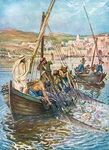The countercultural virtue of a disciple!
←
→
Page content transcription
If your browser does not render page correctly, please read the page content below
Dear Friends,
The countercultural virtue of a disciple!
This weekend’s liturgy of the word presents three of the February 06, 2022
greatest witnesses in the Bible possessing a quality that is
a result. At Mass we echo that famous Roman centurion:
quite ‘unpopular’ in our progressive culture namely
“Lord I am not worthy that you should enter under my
‘declaration of worthlessness’. In the first reading, Isaiah re-
roof, but only say the word and my soul shall be
ceives a vision of heaven itself. The Lord is seated on a high
healed” (Mt 8:8). God reaches out and fills the humble with
and lofty throne. The Seraphim angel choir is crying out,
courage, strength, and purpose and often a miracle of
“Holy, holy, holy is the Lord of hosts! All the earth is filled
abundance.
with his glory!” He has a vision of heavenly liturgy. And Isaiah
reacts with shame. “My eyes have seen the King, the Lord of The fisherman in Simon Peter understood the message
hosts! But woe is me, I am doomed! For I am a man of un- very quickly. He tried and failed though he chose the right
clean lips, living among a people of unclean lips.” In response time and location for fishing. When confronted by the size
an angel swoops down with a burning coal to cleanse his lips! of the catch, he recognized the presence of God before
him and became convinced of his own pride and self-
He is doomed, alright, but doomed to be made clean through
centeredness, that is, of his sinfulness. We find the same
suffering, to be made able and willing to be a messenger of response in all three readings today. In each instance, the
God most high. recognition of unworthiness marks a turning point in the
In the second reading St. Paul says that Christ appeared to speaker’s life and becomes the model for our own re-
him last of all, as to one born abnormally. “For I am the least sponse to God. With Peter, Jesus seized this opportunity to
proclaim the fisherman’s mission (a mission that included
of the apostles, not fit to be called an apostle, because I per-
the rest of the disciples), a call Peter was able to receive
secuted the church of God.” Unworthy, yes. But the grace of because he had seen the tremendous power of God. Thus,
God transformed him to be a great apostle even though he Peter became the first person in the Gospel to
never met Jesus in person except in visions. acknowledge his sinfulness. He is also the first apostle to
be called by Jesus. Today’s Gospel concludes with an in-
In the Gospel story Jesus tells Peter, James, and John to fish
spiring image of commitment and the spiritual miracle
in the deep water (where they had been fishing and fishing
“When they brought their boats to the shore, they left eve-
and fishing all night with no result). We should remind our- rything and followed him” (Lk 5:11). What
selves that Jesus was an expert carpenter, and his fishing is holding you back from a total ‘yes’ to
crew are expert fishermen. Without warning, their nets are God?
bloated with fish. Peter cries out, “Depart from me, Lord, for I
Be blessed.
am a sinful man.”
Fr. Tom Kunnel C.O.
The real reaction of all three figures is not really shame, which
means concluding that they are each worthless. Instead, it is a
finding of their true place in reality. They are expressing a
kind of humility! Each of them is forced to compare himself
directly with the presence of God. When people meet the holi-
ness of God head-on, they are therefore able to glimpse by
contrast the humanness in themselves. None of them can any
longer pretend that they shine like the stars because they see
the real star bursting with light or like a little flashlight on a
bright sunny day. Experience of God let them understand that
they are little, but still God wants them. A falsely supposed
importance cannot make us holy. But God can make us holy.
We can be proud to be unworthy if reception of God’s love is
1Responsorial Psalm -- Ps 138
Psalm 138 exemplifies the reality of our life in God. It is
true that God will work out his plans for us. As Paul writes
to the Philippians, "And I am certain that God, who began
the good work within you, will continue his work until it is
finally finished on the day when Christ Jesus returns" (Phil.
1:6). In this truth, we stake our lives. Yet there are times
when we aren't so sure. We wonder. We worry. We doubt.
Psalm 138 encourages us to not hold back in those times,
but to lay before the Lord both our confidence in him and
our hesitations. He will take all of these and work them
together for his purposes.
The psalm is also a response to God's forgiveness, so domi-
nant in today's readings. The sinfulness that separates peo-
ple from God is overcome by a humble and open spirit
(vv3, 7), evidenced in the lives of Isaiah and Peter.
Yet Psalm 138 does not end with a firm confession of trust
in God's care. Rather, it concludes with a focused request:
"Don't abandon me, for you made me" (138:8). It's as if
David's trust in God wavered for a moment. "Lord," he
prayed, "you will fulfill your purpose for me. Yes, indeed.
Oh, but don't forget me! Don't abandon me!"
2 2The first reading: Is 6:1 - 2, 3 - 8
The cultic features of the theophany (praise of
The year of Isaiah's call was 742 B.C., the year of King Uzziah's
Yahweh, smoke, the enthronement) set the
death. The call is situated in a liturgical setting with the descrip-
prophet's experience in a transcendent atmos-
tion of the theophany going between the earthly and heavenly
phere. His first reaction is one of imminent
sanctuaries. It may well have been that Isaiah's presence at a
death because of his unveiled vision of God,
temple liturgy was the occasion of his call. The imagery, there-
something not accessible to humans (v5; Ex
fore, even when speaking of heavenly realities, relies heavily on
33:20; Jgs 13:22).
the temple setting.
The overpowering sense of God's otherness in
The dominant note is one of Yahweh's transcendence. He is depicted as en-
the theophany only makes the prophet more
throned with a lengthy royal train (v1). Seraphim (the burning ones) are compo-
aware of his human imperfection. Sinfulness is
site creatures, human and celestial, with six wings, who attend the throne (v2).
identified with his lips (v5) since his is to be a
Their cry extols the holiness of God. Holy (Heb: qadosh): The Hebrew word
preaching ministry. His mouth, symbolizing his
Qadosh stresses otherness and transcendence, with sinlessness necessarily
whole person, is purified, thus enabling him to
attached to these attributes. This otherness becomes visible in God's glory, a ref-
exercise his prophetic role (v7).
erence to his earthly sovereignty which here extends to all people.
The second reading: 1 Corinthians 15:1-1, Some Corinthian Christians questioned Paul’s authority and disputed the doctrine of
the resurrection of the dead. Paul silenced them by presenting the evidence for the Resurrection of Jesus. Then he recounted the sto-
ry of how he had been chosen to be an apostle to the Gentiles by the Risen Lord who appeared to him on his trip to Damascus. But
Paul confessed his unworthiness to be an apostle because of his former persecution of Christians and gave the full credit to God for
his call to the ministry: “By the grace of God I am what I am.” That is, it was only by the grace of God that Paul was claiming the desig-
nation of “apostle” and only by that authority that he proclaimed the Gospel, toiling harder than the other apostles. He reminded the
Corinthians that he had already passed on to them the traditional confession of Faith about Jesus’ death and Resurrection, which he
had received personally from Christ Himself. Hence, the Corinthians should not doubt his teaching about the resurrection, lest they
forfeit salvation and wind up having believed in vain. A real Faith not only accepts the content of God’s message but involves a total
surrender of oneself and all one has into God’s hands. Our response to God’s grace must be like that of Paul.
GOSPEL INSIGHTS : Lk 5:1 - 11 The fishermen and fishing: The scene is a carpenter. Hence Peter, perhaps not
Epiphany on the sea: The story of the the Sea of Galilee (Gennesaret in Greek wanting Jesus to look foolish, explained,
miraculous catch of fish described in and Tiberias in Latin). This body of “Master, we have worked hard all night
today’s Gospel is similar to the post- water is thirteen miles long and seven long, caught nothing.” Peter might have
Resurrection appearance of Jesus re- and a half mile wide. In Jesus’ time, added that fish come to the surface in the
counted in John 21:4-14. In both ac- there were ten prosperous towns situ- Sea of Galilee only at night, or that the
counts, the apostles at first fail to rec- ated around the lake. Most of the peo- presence and noise of people would
ognize who Jesus is, then receive a rev- ple residing in them made their living frighten the remaining fish away. Instead,
elation of his true identity. This prompts from the waters in front of them. Thus, he said, “Nevertheless, if you wish it, I will
a full confession of Faith from Simon one gets the idea of how rich the lake lower the nets.”
Peter to which Jesus responds by com- was in fish. The Sea of Galilee was the Hope against hope: That declaration of
missioning him as the representative of site of many manifestations of Jesus’ trust was what made the miracle that fol-
the disciples. In this sense, both narra- Divine power. In the incident in today’s lowed possible. Con-
tives are Epiphanies in which Jesus re- Gospel, Jesus preached from Peter’s fronted by the size of the
veals himself to the world as the Messi- boat to a large crowd, jammed togeth- catch, he recognized the
ah —for Jesus does what only God can er at the edge of the water. When the presence of God before
do. The point of this story lies, not in teaching had ended, Jesus told Peter him and became con-
the miraculous catch, but in the confes- to pull out into deeper water for a vinced of his own pride
sion of Peter and his commissioning by catch of fish. In matters of fishing, Pe- and self-centeredness,
Jesus. ter was an expert, while Jesus was only that is, of his sinfulness.
3 3Dimensions of discipleship:
The Gospel reading today
QUIZ TIME
displays the three dimensions of discipleship: (1) 1. In Isaiah's vision, whom did he see surrounding the Lord?
the recognition of the power of Jesus, (2) the response of A) Kings B) Animals C) Angels D) Children.
confession, and (3) the assurance of success when we fol-
low God’s word. Peter’s commission is one which is re- 2.What did Jesus do on the third day after He died for our
peated often in the New Testament (Lk 9:20, 22:32; Jn sins? A) Went to Heaven B) Got buried C) Rose from the
21:1ff; Mt 16:16ff). Peter and the other disciples were dead D) Came down from the cross
given the privilege of sharing in Christ’s work of gather-
3. What amazing thing happened on the boat in the Gospel?
ing people to God. As they shared in gathering the fish, so
A) Jesus walked on water B) The sea dried up C) The boat
now they would share in gathering “lost” human beings.
sank to the bottom of the lake D) They caught an amazing
Simon’s response was similar to the responses made in number of fish.
Old Testament human encounters with God. As he stood
before the burning bush, Moses confessed his disqualifica- 4. Why did Simon Peter want Jesus to leave?
tions for leadership, particularly his inability to speak A)He didn't want so many fish B) He was a sinful man
well. (Ex 3:11-4:17, esp. 4:10). Later in the Bible, when C) He wanted to keep fishing D) He wanted to walk on water.
God came to Solomon in a dream, Solomon declared that
he was not wise enough to govern God’s people and asked 5. What did Jesus tell Simon Peter he would be catching
for an “understanding heart” (1 Kgs 3:7-9). Likewise, from now on?
when God called Jeremiah, the prophet recognized the A) Deer
inadequacy of his youth to take on this mission (Jer 1:6). B) Fish
C) Frisbee
D) People
Who are called as the fishers of men? It is not true that
Christ’s invitation to become “fishers of men” is ad-
dressed only to the apostles and their successors (the bish-
ops together with the priests and religious). Every Chris-
tian is commissioned to a ministry of love and justice by
virtue of his/her Baptism. One of the documents of Vati-
can II, Lumen Gentium (Dogmatic Constitution on the
Church ), in paragraph no. 31 describes all of us very
clearly as, “the faithful who by Baptism are incorporated
into Christ’s Body and are placed in the people of God
and in their own way share the priestly, prophetic, and
kingly office of Christ and, to the best of their ability, car-
ry on the mission of the whole Christian people in the
Church and in the world.” In addition to this, Vatican 1. What do you see that Isaiah, Paul and Peter have in
II’s Apostolicam Actuositatem (The Apostolate of the Lai- common? Why did they feel so?
ty), no. 3 says, “Incorporated into Christ’s Body through
2. What is the contribution of Paul to Catholic faith
Baptism and strengthened by the power of the Holy Spirit
and teaching?
through Confirmation, the laity are assigned to the aposto-
late by the Lord Himself.” It is even stated that where lay 3. What do you think we will find when we go out into
involvement is lacking, “the apostolate of the pastors will the deep, or as Pope Francis says, to the “open sea
frequently be unable to obtain its of the humanity of our time”?
full effect; where lay responsibility
is absent, the Church is incom- 1C, 2.C, 3D, 4B, 5.D
plete,” (Apostolicam Actousitatem nos.
10, 21, PCP II). QUIZ ANSWERS
www.stjohnnewman.org RESOURCES USED WITH PERMISSION FROM FRTONY HOMILIES, SUNDAY WEBSITE–
ST LOUIS UNIVERSITY, LPI, SERMON CENTRAL, CATHOLIC BRAIN
4 4You can also read



























































